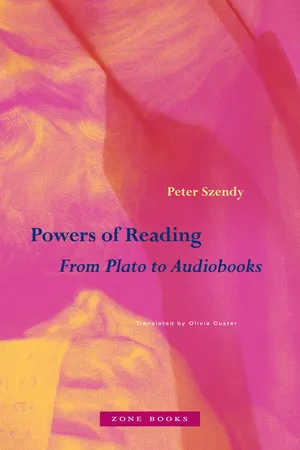
- English
- ePUB (mobile friendly)
- Available on iOS & Android
About this book
A historical, literary, and philosophical study that transforms our understanding of reading
"Peter Szendy offers a subtle, persuasive, and unprecedented account of the time of reading and its scene of address, one that is as archaic as it is contemporary. When we read, are we listening to a voice or being read to? If it is not a private and monologic exercise, how do we understand the populated scene of reading? What reads when we read, and how does reading push and pull between temporalities and voices? Why do we keep leaving the text when we seek to obey the injunction to stay within its terms?
Questions such as these produce a fresh, even startling, consideration of a wide range of literary and popular texts, including Hobbes’ Leviathan, Flaubert’s Madame Bovary, Kant’s moral injunctions, Sade, Valéry, Blanchot, and de Certeau, but also modern fiction, film, audiobooks, and hypertext. The power of reading turns out to belong to its surprising engagement with time and direction: the deliberate reader stays close but strays, tries to fill in the gaps but gets pushed back by a countercurrent. The key to the text is sought ‘outside’ only to be led back to the text and its failure to deliver a final answer. Equally at odds with older versions of literary formalism that insist on the self-referentiality of the text as well as contextualists who scour an external social order to discover the truth of the text, Szendy approaches that very conflict as an oscillation constitutive of reading itself. Paradoxically, reading is sustained precisely by what interrupts its teleological flow.
The result is a comic, profound, and timely reconceptualization of reading which rushes forward only to find itself pushed back into the heart of the text, which discovers that this incessant breaking from the text, this headlong rushing ahead to the world outside the text is a sequence of overreach, delay, and return that forms the ragged rhythm of reading itself. Powers of Reading is a patient, brilliant, and illuminating inquiry into the crosscurrents of voice and address, one that speaks to the speed and complexity of our time, how we are upended by our forward propulsions, to consider how multiple voice, action, and passivity are all rearranged in the scene of reading."—Judith Butler, Distinguished Professor in the Graduate School, University of California, Berkeley
Frequently asked questions
- Essential is ideal for learners and professionals who enjoy exploring a wide range of subjects. Access the Essential Library with 800,000+ trusted titles and best-sellers across business, personal growth, and the humanities. Includes unlimited reading time and Standard Read Aloud voice.
- Complete: Perfect for advanced learners and researchers needing full, unrestricted access. Unlock 1.4M+ books across hundreds of subjects, including academic and specialized titles. The Complete Plan also includes advanced features like Premium Read Aloud and Research Assistant.
Please note we cannot support devices running on iOS 13 and Android 7 or earlier. Learn more about using the app.
Information
Table of contents
- Cover
- Title Page
- Copyright
- Contents
- Preface to the English-Language Edition Readers and Readees
- … have you started reading?
- A Strangely Familiar Voice (“The Sandman”)
- The Anagnost and the Archon
- Loving-Reading (Phaedrus)
- The Nameless Reader (Theaetetus)
- The Categorical Imperative of Reading (Philosophy in the Bedroom)
- In Court (Madame Bovary)
- Reading Genders (If on a Winter’s Night a Traveler)
- Reading, Binding, Unbinding
- The Reading Machine (Leviathan)
- Fast Reading (Three Times Faust)
- Readers’ Correspondence (War and War)
- Archereading
- Notes